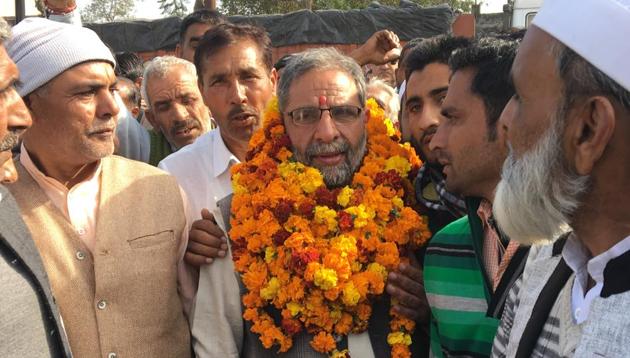UP election: How Shamli’s Thanabhawan seat will test Akhilesh Yadav’s politics
Meet Sudhir Panwar, a Lucknow University zoology professor and state Planning Commission member, who is the SP candidate from Thanabhawan, a constituency in Shamli that goes to polls on Saturday.
Akhilesh Yadav’s entire political image-makeover rests on two pillars - clean politics, free of crime; and transcending the caste and communal divide. This, in the narrative of Akhilesh supporters, is what distinguishes him from his father and uncle, and the politics of identity and crime that permeated the Samajwadi Party.

And if this is to be tested, travel to one west UP seat - where Akhilesh has gambled with his choice of candidate.
Welcome to Thanabhawan, a constituency in the Shamli district that goes to polls on Saturday. The BJP candidate here is Suresh Rana, often in the news for his provocative remarks and his role in Muzaffarnagar riots. But the SP candidate is a Lucknow University zoology professor and state Planning Commission member, Sudhir Panwar.
From policy to politics
As he filed his nomination a fortnight ago, Panwar was confident about making the transition from academia to mass politics. He traced his roots to Bhainswal village in the district, he spoke of his family there, and told a group of supporters at home, “You don’t have to hang your head in shame when you vote this time. District administration officials were surprised when they saw my form - and that there were no criminal charges. This is a new experiment. We need your support”
Does he feel odd being in a party known for its image of goondagardi? “SP is in transition. There is hardly anyone now with such a background. In fact, it is the party known to be opposed to goondas.” Panwar says he first got attracted to Akhilesh when he denied D P Yadav a ticket back in the 2012 polls. “And now the CM is in full control.”
But there are many candidates without criminal antecedents.
What is interesting in Panwar’s case is that he has actually worked on policy before entering politics for the CM. “He asked me first prepare a report on health services, then on the pollution of the major rivers in this area, on the development of the dairy sector and livestock. I later prepared a blueprint of this area’s development. It is only 100 kms from Delhi, yet practice primitive farming; the infrastructure is poor.”

Persistence of identity
But what one cannot escape in the politics of UP is the pull of identity, which is why constituency demographics becomes key.
Thanabhawan has 80,000 Muslims, 45,000 Jats, 35,000 Kashyaps, 30,000 Dalits, 18,000 Thakurs and then others.
Panwar is a Jat. And while he hopes to get the votes of both Jats (because of his own background) and Muslims (because of the party he represents), it is precisely this background which could be a disadvantage. Jats are not big supporters of his party, and Muslims may not yet like to vote for a Jat given recent acrimony. And that is why the candidature is a gamble. An additional challenge for him is that the BSP candidate is a Muslim - and thus minority votes may fragment.
Panwar says, “My candidature in a minority dominated area is proof that Akhilesh believes in secular politics, that charges of SP being one sided is not true.”
Whether Panwar wins or not will be an interesting test of whether UP is ready for the entry of technocrats in mass politics. It will also give a glimpse into the state of identity-based divisions in west UP. And most importantly, it will show if Akhilesh’s gamble - in projecting a new face - will work or not.
Follow full coverage of UP election here





